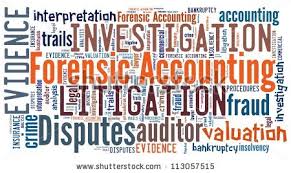Forensic accounting is the specialty area of the accountancy which anticipates disputes or litigation. The forensic accountants generally have to investigate information which is suitable to be presented in the court.
Forensic accounting uses accounting, auditing, and investigative skills to undertake enquiries into theft and fraud. The work of forensic accountants is to surprise the perpetrators of the estimated theft and fraud. This includes money laundering, window dressing and identity theft activities as well as tax evasion. Insurance companies engage forensic accountants to detect insurance frauds and law firms employ forensic accountants to identify marital assets in divorce cases and family’s power of attorney.
Forensic accounting has been pivotal in the corporate agenda after the financial reporting scams which took place in some companies around the world and shook the investor and the customers (see, for example, Enron, Coal India, Satyam, Tyco, and WorldCom, just to mention a few). These scandals resulted in the loss of public trust and huge amounts of money. In order to avoid fraud and theft, and to restore the badly needed public confidence, several companies took the step to improve the infrastructure of their internal control and accounting systems drastically. Thus leading to the inception of “forensic accountants.”
Forensic accounting relies on the fraud triangle to identify fragile points in the business organisation and locate possible defaulters. It consists of three core concepts: incentive, opportunity, and rationalization. People must have the incentive and opportunity to commit financial fraud, as well as the ability to justify it. Recent analysis has suggested adding a fourth concept to make a diamond—capability. Just because someone has the opportunity or incentive to steal does not necessarily mean that they have the capability to do so.
The job of a forensic accountant involves assessing the risk of fraud and illegal acts , evaluating the adequacy of internal control systems, substantive testing of transactions during an attest or a general consulting engagement and designing and implementing internal control procedures. It also consists of preparing company codes of business ethics and conduct and developing corporate compliance programs.
Forensic accounting has made it to the list of top 20 future jobs in articulation with the growing financial scams worldwide in public finance, corporate finance and insurance sector. In India, CAG is an external auditor for the government of India which has faithfully delivered excelled services in the field of Forensic Accounting
Click here for government certification in Accounting, Banking & Finance




16 Comments. Leave new
unique topic…very good for a layman to understand this term…one must read read this article!!
Nicely explained 🙂
Nice topic selection !!! Keep writing about such topics in future too!! Great work 🙂
Good effort!
Well explained
Nicely explained, the concepts of forensics are based on its very definition, be in any field.
A new concept. Really good
well presented and written
Well explained topic
very nice and unique article
Good explanation with something new i got to learn today!
Nice work!
Well explained..!
Nicely done
well written
Well explained